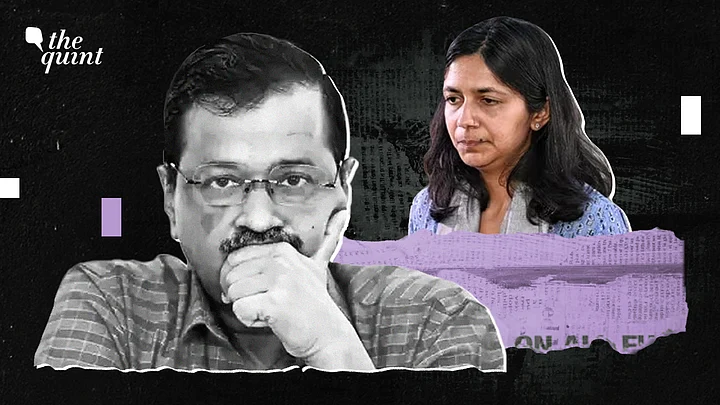When Delhi Chief Minister Arvind Kejriwal declared Swati Maliwal, the chairperson of the Delhi Commission for Women (DCW), as a Rajya Sabha nominee, a wave of elation swept through the ranks.
For the old guard of volunteers and supporters, Maliwal was more than a political figure; she was the embodiment of the ideals that the Aam Aadmi Party had championed since its inception in the crucible of the India Against Corruption movement. Yet, now, at a pivotal moment, the party stands at a crossroads, its inner circle fractured.
The filing of an FIR by Maliwal against Arvind Kejriwal’s private secretary, Bibhav Kumar, alleging assault within the Chief Minister’s residence, has sent shockwaves through the party’s foundation.
The fissures in the relationship didn’t emerge overnight.
Maliwal’s elevation to Rajya Sabha MP was a harbinger of the impending Lok Sabha elections—a time when political machinations intensify. Having been the architect behind AAP’s electoral strategies, her sudden absence from the limelight raised eyebrows.
Insiders paint a picture of Maliwal as a ghost in the capital, her presence ephemeral even when physically in Delhi. Her abrupt departure, attributed to her sister’s severe illness, left the party leadership in a lurch.
The drama intensified with Kejriwal’s arrest, prompting desperate pleas for Maliwal’s return. The perceived abandonment was a blow to the AAP, particularly as Sanjay Singh’s imprisonment left only two Rajya Sabha MPs, Sandeep Pathak and ND Gupta, to shoulder the on-ground responsibilities.
Kejriwal’s interim bail coincided with Maliwal’s return to Delhi and despite her attempts to reconnect, the Chief Minister’s Office remained elusive, denying her any appointments. Maliwal then went into the chief minister’s residence, apparently sans invitation — a bold move that symbolised the final rupture of trust.
AAP's Mishandling of the Issue
With Kejriwal’s campaigning window cut to a mere 21 days, and Delhi’s poll date looming, the AAP's handling of the Swati Maliwal situation calls for scrutiny.
The press conference by Sanjay Singh, which laid bare the alleged misconduct of Bibhav Kumar, has become a focal point of controversy. AAP insiders suggest that Maliwal, the emblematic figure of AAP’s women empowerment narrative, had initially agreed not to pursue legal action against Kumar if the party disciplined him. However, her subsequent statement to the Delhi Police blindsided the party, revealing a chasm between public posturing and private assurances.
The quandary deepens when considering Maliwal’s stature within the party. Her contributions to flagship policies like free bus travel for women and financial aid proposals have been pivotal. If suspicions of her being a BJP pawn were pre-existing (as asserted by Atishi in her press conference), why then did Singh acknowledge Kumar’s transgressions?
The release of ambiguous videos attempting to clarify the incident has done little to dispel doubts. With the women’s vote poised to play a decisive role in the 2024 Lok Sabha elections, AAP’s mismanagement of the Maliwal case could prove detrimental. The BJP’s consistent vote share in Delhi underscores the need for AAP to maintain its electoral base and avoid any last-minute swings.
The lingering question is whether Kejriwal’s reluctance to confront Kumar stems from deeper concerns, possibly linked to the ED’s interrogation of him in the liquor policy case. The case, built on statements from individuals like C Arvind, a trusted aide of former Deputy CM Manish Sisodia, adds another layer of complexity to the unfolding drama.
BJP Seeks to Capitalise
Jumping to the conclusion that Swati Maliwal acted under the influence of the BJP to tarnish the AAP is premature. There is no substantial evidence. The BJP's desire to take advantage of this situation does not automatically render Maliwal a mere instrument in its hands. But the Delhi Police’s unusually rapid response in this matter is particularly suspect, considering their historical hesitance in similar situations.
The fact that senior BJP figures, including the Finance Minister, the Home Minister, and party president JP Nadda, have weighed in on the incident, says a lot. The party has consistently secured over 35 percent of the vote share in Delhi, even in the assembly elections that it lost to the AAP.
For instance, the BJP garnered approximately 38 percent in the 2020 Delhi assembly elections and an impressive 56 percent in the 2019 Lok Sabha elections, where it swept all seven seats, a vote share differential of about 18 percent.
While sympathy for the AAP following Kejriwal’s arrest and release is palpable, it’s also essential to acknowledge the significant number of swing voters in Delhi, who tend to support the AAP in assembly elections and pivot to the BJP for Lok Sabha elections.
Considering Maliwal’s commendable tenure as DCW chief from 2015-2024, serving the women of Delhi’s slum clusters with unwavering dedication, the BJP is aware that any controversy surrounding her could disillusion her supporters, potentially swaying them away from the AAP.
(The author, a columnist and research scholar, teaches journalism at St. Xavier's College (autonomous), Kolkata. This is an opinion piece and the views expressed above are the author’s own. The Quint neither endorses nor is responsible for the same.)
(At The Quint, we question everything. Play an active role in shaping our journalism by becoming a member today.)
